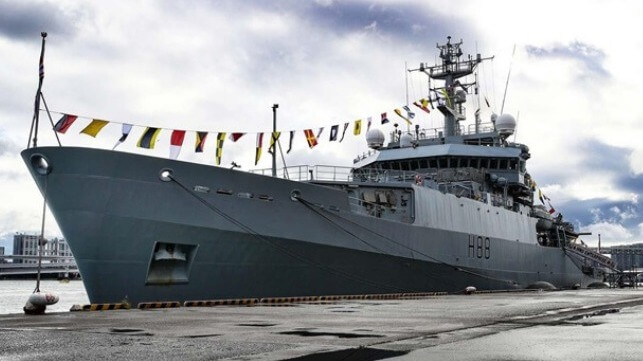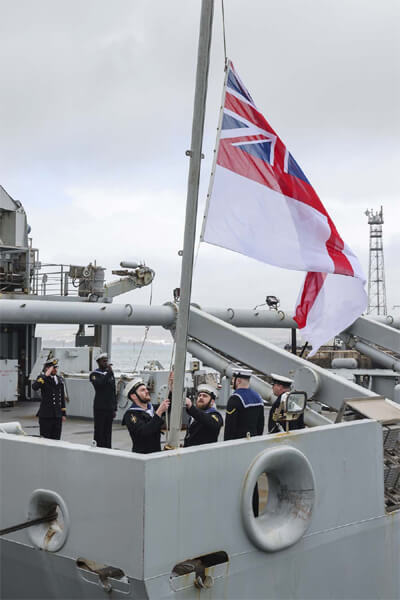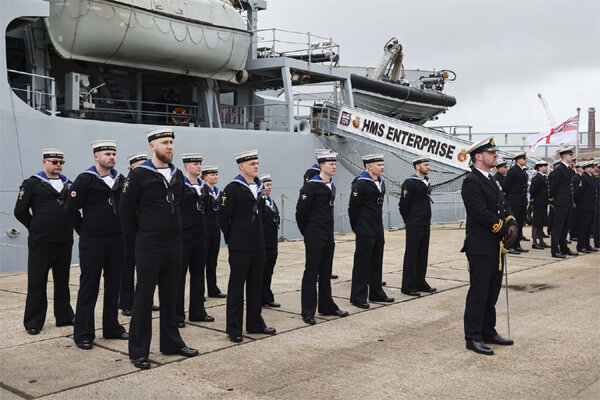Royal Navy Decommissions HMS Enterprise Ending Ocean Survey Service

A Royal Navy survey ship that went beyond its primary mandates to take part in many global missions and helped in humanitarian crises including the Beirut port explosion has been decommissioned after steaming more than 500,000 miles in a career spanning two decades. The HMS Enterprise, which was considered one of the most versatile ships in the Royal Navy, and which was the second of two Echo-class survey ships alongside HMS Echo, was decommissioned on March 30 at the Portsmouth Naval Base ending 20 years of service.
The Enterprise, which is the tenth ship in the Royal Navy’s evolving fleet to bear the name was ordered in 2000 and built by the historic Appledore Shipbuilders, which today is working to relaunch after being acquired by Harland & Wolff. Named by Lady Sally Forbes, the vessel was commissioned in 2003 to carry out hydrographic and oceanographic operations across the world besides ensuring safe navigation on and under the water and acted as a floating base for mine countermeasure activities.
Over two decades, its missions took the vessel to the four corners of the globe from Japan and the Pacific Rim, the heat of the Gulf and Middle East, the icy waters of Norway and the High North, the Falklands, the Mediterranean, and European waters far beyond its regular hydrographic duties.

Ensign is lowered for the last time
Though not designed for humanitarian missions, the ship was among the early responders that helped victims of the port of Beirut explosion in August 2020. Following the explosion that devastated Lebanon’s capital city, Enterprise spent weeks supplying essential commodities to the victims.
In 2014, the ship was involved in another humanitarian mission in Libya where it evacuated civilians caught amid civil unrest. The ship has also spent extensive periods supporting the international operation to rescue migrants in the deadly waters of the Mediterranean. These rescue missions earned the ship the military’s highest peace prize, the Firmin Sword.
Apart from humanitarian missions, the ship has over the past five years been involved in a diverse span of activities ranging from detecting mines in the Arabian Gulf to saving lives and disrupting the work of human traffickers as part of a European task group Operation Sophia.
At the decommissioning ceremony attended by Lady Sally Forbes alongside Admiral Sir Ian Forbes, Enterprise Commanding Officer Commander Malcolm McCallum said the ship has been of great service to the Royal Navy over its 20 years of operation. “Throughout her service over the last two decades, she has continually punched above her weight, delivering real operational effect and representing the nation throughout the world. Her influence has been truly global,” he said.
The Enterprise was often at home in its key mandates of mapping and surveying the ocean floor. Over the years, the ship has surveyed hundreds of thousands of square miles of ocean floor and in 2022 earned the rare distinction of venturing closer to the North Pole than any other Royal Navy vessel, sailing within 1,000 miles of the top of the world.

Crew of HMS Enterprise during decommissioning ceremony
The ship, which was manned by a 50-strong crew who are experts in examining and mapping the seafloor, has also been into the Arctic to update charts and scientific understanding of waters increasingly patrolled by Royal Navy warships to maintain freedom of navigation of the High North.
Following the decommissioning of the Enterprise and her sister vessel Echo which was decommissioned in June 2022, the Royal Navy is set to change tactics in ocean surveying. Through the Future Military Data Gathering Program being introduced over the next 18 months, the Navy intends to deploy drones and autonomous systems on other vessels – including commercial ships – to gather the relevant information.
No comments:
Post a Comment